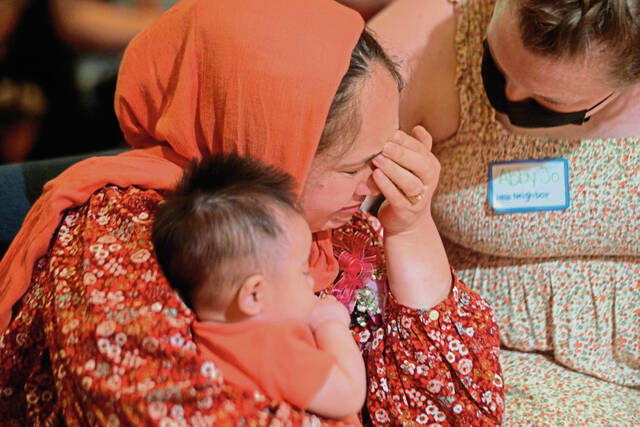https://mirror.triblive.com/opinion/sloane-davidson-pittsburghs-population-decline-can-be-improved-by-retaining-not-just-recruiting-newcomers/
Sloane Davidson: Pittsburgh’s population decline can be improved by retaining, not just recruiting, newcomers

Pittsburgh’s population has been steadily declining since the collapse of the steel industry nearly 50 years ago. We now have one of the oldest populations in the entire United States, and deaths outpace births every year. Migration out of urban areas is seen throughout the country, but no metropolitan area has suffered quite like Pittsburgh.
While some might be cheering for less traffic, our population decline has serious negative impacts on our community. Pittsburgh is close to dropping to a lower federal category, meaning a significant loss of funding that goes to infrastructure and social programs. Our region also has had the slowest employment growth out of the U.S.’ 40 major metropolitan areas as our retirement community increases without younger workers to replace them.
Sure, spending less time in traffic is great, but it won’t be long before the more negative effects of our population decline arenoticeable at every stoplight.
The good news is we are a resilient city, and we can (and are) doing something about it.
Welcoming immigrants and refugees can be one of the most successful forms of population growth and retention, revitalizing our neighborhoods and creating a vibrant environment for all residents.
Our newest neighbors bring a commitment to strong roots, intercultural understanding and a fresh sense of hope that will help us build the strong communities we need to sustain Pittsburgh. Unlike some metropolitan residents who are eager to get out of the city, refugees often invest in buying homes and are committed to staying in the area for the foreseeable future.
This means better-maintained houses and more contributions to community organizations that create safe and thriving neighborhoods.
A shrinking population creates strain on a community’s social services and infrastructure. Recently resettled families can help alleviate these challenges as they contribute to tax revenues that fund everything from teachers and emergency services to pothole repair. Supporting the funding of public services such as education, health care and transportation is good for everyone of all ages and backgrounds.
Refugee resettlement programs like Hello Neighbor also generate funding from national organizations that contribute to local infrastructure.
Population decline in cities such as Pittsburgh is synonymous with slowed economic activity, but, by investing in refugee integration, entrepreneurship and skill development programs, we can help new neighbors truly revitalize the cities through which we walk.
Foreign-born populations and those with lived migration experience are three times as likely to start their own businesses, and that spirit of entrepreneurship helps Main Streets across the region.
Immigrants and refugees help solve the numbers problem, but they also help address skill gaps in the Pittsburgh workforce. Their past experiences navigating potentially life-threatening situations and entirely new environments foster resiliency and hard-working traits that make them excellent workers and entrepreneurs.
Refugees often bring different professional qualifications that align with local labor needs.
After likely fleeing everything they knew with next to nothing, many refugees feel a deep sense of isolation. They frequently live under the poverty line, with more than half of the world’s refugees being women and children. Because of government regulations and shortages, refugees often don’t have access to affordable housing. All of these barriers and more — including language and cultural differences — make it extremely difficult for refugees to resettle without additional support.
Refugees aren’t the only group that contributes positively to our region’s population growth. Other valuable “new neighbors” include returning college graduates and education and health professionals, as well as tech startups and their employees. While each of these groups is unique, they share a power in their capacity to bring the numbers, talent and skills, and community growth Pittsburgh desperately needs. But they won’t come — and definitely won’t stay — if we don’t foster a welcoming environment.
On the individual level, ensuring the future of a healthy Pittsburgh starts with welcoming. Lend a hand and celebrate your neighbors, especially the new ones who might be getting acclimated to a brand new culture and environment. Recognize and celebrate cultural differences. Volunteer with local organizations that support refugees in successfully joining their new communities.
Attend local community engagement events that reconnect you with your Pittsburgh neighbors.
There is no better time than now. June 20 is World Refugee Day, and June is Immigrant Heritage Month. But, really, these small actions should be done on a daily basis throughout the entire year to create a strong, lively community. It doesn’t have to be much. Even a smile goes a long way to retaining our new neighbors who will help us create healthier communities and economies.
Sloane Davidson is founder and CEO of Pittsburgh-based Hello Neighbor, which works to improve the lives of recently resettled refugee families by matching them with dedicated neighbors to guide and support them in their new lives.
Copyright ©2026— Trib Total Media, LLC (TribLIVE.com)
